 Alternative for Germany held its conference during the last weekend of July in the thousand-year-old city of Magdeburg, located by the Elbe River in the eastern German state of Saxony. The first of the two conference days began with a strong program speech by the party's male spokesperson. Subsequently, party officials were elected and motions were addressed. The second day was entirely devoted to candidate selection and positioning for the EU election in June next year. Screenshot: AfD on Facebook
Alternative for Germany held its conference during the last weekend of July in the thousand-year-old city of Magdeburg, located by the Elbe River in the eastern German state of Saxony. The first of the two conference days began with a strong program speech by the party's male spokesperson. Subsequently, party officials were elected and motions were addressed. The second day was entirely devoted to candidate selection and positioning for the EU election in June next year. Screenshot: AfD on Facebook
Strong Confidence in German AfD
Alternative for Germany (AfD) held a party conference on July 29-30 to select candidates for the upcoming EU election next year. EU Parliament member Maximilian Krah, belonging to the party's more radical, ethnonationalist faction, was appointed as the top candidate. The party's two spokespersons delivered powerful speeches criticizing the EU's failed migration policy and trade sanctions that isolate Europe and Germany from the rest of the world. They argued that it's time for the EU to return a significant portion of its power to national parliaments. However, they have dropped the demand for Germany to exit the EU.
Published: August 28, 2023, 11:08 am
AfD has achieved significant successes in recent state elections and averaged over 20 percent in nationwide polls leading up to the conference. The party’s highest numbers are still in the former East German regions, but it has recently gained noticeable traction in the more politically correct western parts. For example, in the latest state election in Niedersachsen, just south of Hamburg near the Netherlands border, AfD achieved 11 percent.
The party has resisted various attempts at liberalization over the years as it has grown. Notably, patriots managed to rally a majority of AfD members behind an ethnonationalist stance instead of the cultural nationalism advocated by the liberal faction. Another significant stance was the party’s strong opposition to unscientific lockdowns and medical coercion. Criticism that these positions would damage the party’s popularity has been proven wrong, as AfD has continued to achieve success.
Thus, the party, with a strong self-assuredness and momentum, held its EU election conference on July 29-30, with around 600 delegates from across Germany in attendance.
Comprehensive Opening Speech by Spokesperson Chrupalla
Alternative for Germany is led by two spokespersons, a woman and a man: economist Alice Weidel and Tino Chrupalla, a small business owner in the auto painting industry. The latter opened the conference and touched on a wide range of political issues in his opening speech.
“We are moving forward. We want to turn the growing support from citizens into further positive results in the upcoming state elections; in Bavaria and Hessen this fall and in Saxony, Thuringia, and Brandenburg next year,” Chrupalla began.
Energy policy was identified as the most significant political theme of the current era.
“Germany was going to abolish fossil fuels, but now gas is imported from the USA since Nord Stream has been shut down. The shutdown must be clarified, and those responsible held accountable,” Chrupalla demanded.
“We are now unilaterally dependent on the USA, but we also want gas from Russia.”
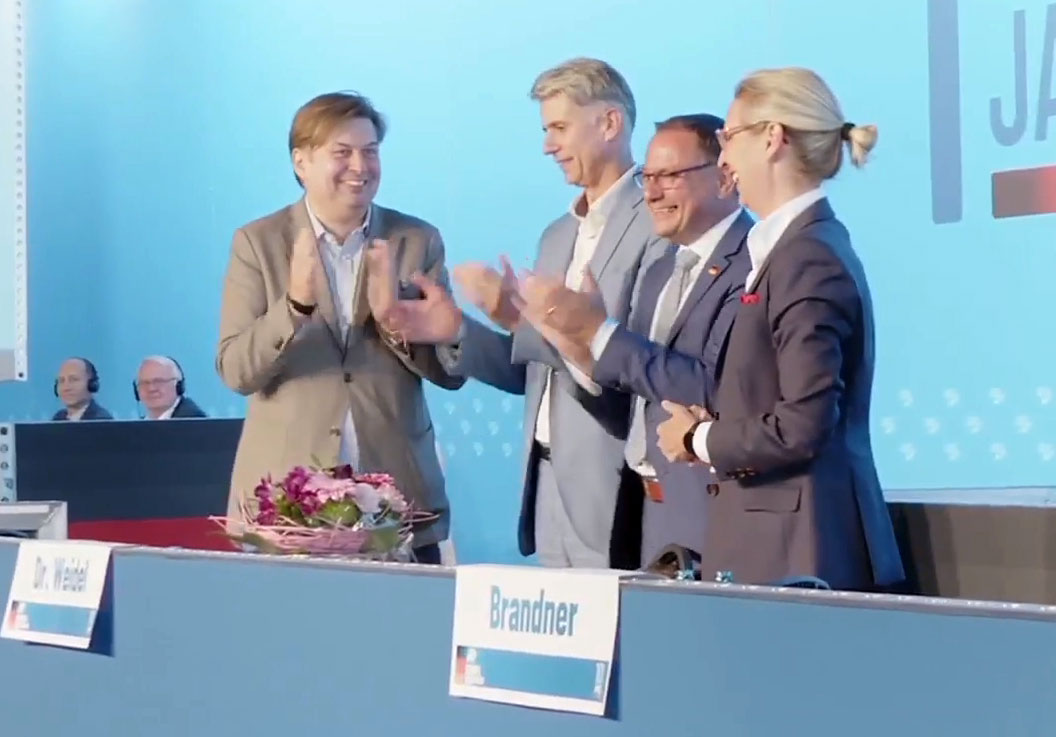
Maximilian Krah (left) was elected as AfD’s top candidate for the EU election, which has sparked outrage in the mainstream media since Krah is considered part of the party’s ethnonationalist faction. On the right are the two spokespersons for AfD, Tino Chrupalla and Alice Weidel. During the conference, they also celebrated that Alternative for Germany turns 10 years old this year. Still image: AfD on Facebook
The eleven sets of sanctions against Russia harm German citizens more than Russia, according to Chrupalla.
“Citizens are affected by higher energy prices. It is not in the interest of German citizens. We want to trade with everyone in the world; we can cooperate with anyone who desires the welfare of the German people,” he asserted.
He identified The Greens as the main adversary in both domestic and foreign policy. The Foreign Minister in the coalition government, Anna-Lena Baerbock of The Greens, Germany’s first woman in this role, was criticized for feminist foreign policy.
“She lacks respect for other countries and wants to dictate how others should live. The Greens want to strangle trade with China, and ideally, they want war with both Russia and China,” Chrupalla claimed.
His criticism can be seen as a reference to a slip-up in spring when Baerbock stated in an interview, “We are at war with Russia.” The statement naturally drew significant attention and raised questions about her competence. She corrected herself the following day, explaining that she “didn’t mean it literally.”
Extensive Foreign Policy in the Opening Speech
Foreign policy took up more space than usual during AfD’s conferences, which is understandable given the war in Ukraine, the Russia sanctions, and the upcoming EU election. Chrupalla stated that he wanted to “restore a good relationship with the Russian Federation.”
“The outbreak of war in 2022 did not come out of the blue,” Chrupalla said. Without naming former Chancellor Angela Merkel directly, he referred to a statement she made:
“The Minsk agreements for negotiations for a peaceful solution were only concluded to buy time to arm Ukraine. The Russians were simply fooled.”
Merkel’s statement is supported by a video clip on social media from NATO’s annual summit in Vilnius on July 11-12, 2023. To a group of journalists with microphones in front of him, the Alliance’s Secretary-General Jens Stoltenberg said, “We have supported Ukraine since 2014 with weapons and training.”
Chrupalla continued:
“We say no to sanctions, warmongering, and arms deliveries to Ukraine. Today, young Ukrainians are dying in German tanks. We want diplomacy and peace negotiations, like Orbán in Hungary. We reject the trade war with Russia.”
When it comes to the war, Russia, and sanctions, AfD is on a direct collision course with the federal government, while the Left Party (Linke) holds a similar stance.
AfD’s spokesperson emphasized that the party wants good relations with all nation-states.
“Russia will continue to play an important role in the future, despite all the legitimate criticism that can be directed towards the country. We are moving towards a multipolar world with several equal powers. We are against unilateral dependencies; we want to maintain and build bridges—not blow them up,” clarified Chrupalla.
Radical Top Candidate
Maximilian Krah, 46, from Oberlausitz in eastern Germany, was elected as the party’s top candidate for the EU election. He is currently a Member of the European Parliament for AfD and received the support of about 65 percent of the approximately 600 delegates. Krah is considered to belong to the ethnonationalist faction of the party, and the press coverage of his election has been almost hysterical.
In previous speeches, Krah has not only stated that the EU is a “disaster for Germany and Europe,” but he has also referred to the significant demographic change. He has criticized the term used by former Chancellor Angela Merkel to describe the large influx of immigrants in 2018: “repopulation.”
“‘Repopulation’ refers to state actions that bring about a fundamental change in the ethnic composition of the population in a certain area. /…/ The term “significant demographic change” sounds harsh, ugly, uncomfortable. The term “significant demographic change” sounds like stabbings, rape, and Islamization. It sounds like the government’s understanding of violent criminals and political discrimination against protests directed against this. So, the term “significant demographic change” sounds like the reality in Merkel’s Germany. That’s precisely why the term must be taboo. Because it expresses the truth.
Germany was supposed to phase out fossil fuels, but now gas is being imported from the USA since Nordstream has been blown up. The explosion must be investigated and those responsible held accountable.
– Maximilian Krah
In 2019, he delivered a speech in which he referred to the German “ethnic people” as opposed to the “citizen people,” stating that they are not necessarily the same thing. According to Krah, the German ethnic people are the “true sovereign” in the sense intended by the constitution and can even set aside this constitution and form a new one.
Krah has also pointed out that mass immigration is a “crazy idea” to make Europe “colorful,” except that the immigrants themselves do not want to “be part of a degenerate, colorful, and diverse population, but come as colonizers.”
Such statements have made Maximilian Krah a target for Germany’s security service, which considers the idea of significant demographic change to be “right-wing extremist conspiracy theories.”
AfD Wants to Reform the EU
On the second day of the party conference, the party’s female spokesperson, Alice Weidel, opened the session, which focused on the party’s program for the 2024 EU election and the selection of candidates for the EU candidate list. Weidel criticized the political situation in the EU and spoke relatively briefly, as the topics of the EU and foreign policy had already been extensively covered in the introductory speech.
She accused the EU of being “deeply undemocratic and all-powerful” and advocated for Europe’s patriotic parties to work towards “a Europe of fatherlands,” moving the power of the EU back to national politics, “where elected representatives of the people sit in their respective parliaments.”
“Our idea of Europe is clear: sovereign nation-states instead of an EU superstate and debt union, free citizens instead of paternalism and bureaucratic protection. People who live together in peace and respect on our continent.”
Our idea of Europe is clear: Sovereign nation-states instead of an EU superstate and debt union, free citizens instead of paternalism and bureaucratic protection.
– Alice Weidel
Alternative for Germany (AfD) was originally founded as a Eurosceptic and EU-critical party, but it soon shifted its focus to criticizing immigration policies and strengthening the nation-state as its main program points.
Throughout its history, there have been voices calling for Germany to leave the European Union. Before the conference, there was a draft EU program stating that “our patience with the EU has run out” and that “we therefore strive for an orderly dissolution of the EU, to be replaced by a new European economic and interest community, a federation of European nations.”
During the conference in Magdeburg, the party leadership made it clear that AfD does not intend to dissolve the EU. Instead, the new direction is to reform the union by transferring a significant portion of power back to individual nations. The party also aims to abolish all subsidies in the energy and climate sector and implement a very strict immigration policy, “which the EU has failed to achieve so far.”
At the conference, it was also decided that AfD would formally join the EU group Identity and Democracy, which has 62 seats and was previously represented through individual parliamentarians. By being a formal party member, AfD increases both its influence and its opportunity for party support from the EU.
“We want to become so strong in the next parliamentary term that it becomes impossible to create a firewall against us and that we gain influence,” said Krah after being elected.
He added that German taxpayers’ money is being wasted on “climate, gender politics, immigration,” and the war in Ukraine.
Similar Problems in Sweden
Germany has, so far with a few exceptions, been spared from shootings and bombings like those that have afflicted Sweden in recent years. However, during debates on various motions, other clear similarities with the situation in Sweden were noticeable.
Some speakers, including teachers, brought up major problems in schools that they believe to have observed: declining levels of education, violence in school environments, and a high number of knife attacks with immigrants as perpetrators.
Some complained about indoctrination in schools, especially in climate issues: controversial viewpoints are presented as absolute facts. Some protested against what they perceived as hidden propaganda for LGBTQ sexuality. The question was posed: “How will young children know where the line is between pedophilia and sexual education?”
Although Germany does not experience the same hysteria with Pride parades and flags as in Sweden, there were still several comments opposing “trans- and rainbow terrorism” in public. At the same time, AfD can hardly be accused of being homophobic; spokesperson Alice Weidel herself lives in a registered partnership with a woman of Indian descent.
Launching a TV Channel
Tino Chrupalla revealed in his opening speech that AfD is collaborating with alternative media and is working on creating a talk show. A motion for having their own TV channel was later approved during the day. It should be noted that German broadcast media, like in Sweden, hardly provides an impartial view of the party. The most neutral term used for AfD is “right-wing populism.” Accusations of “xenophobia” and “extremism” in general are common.
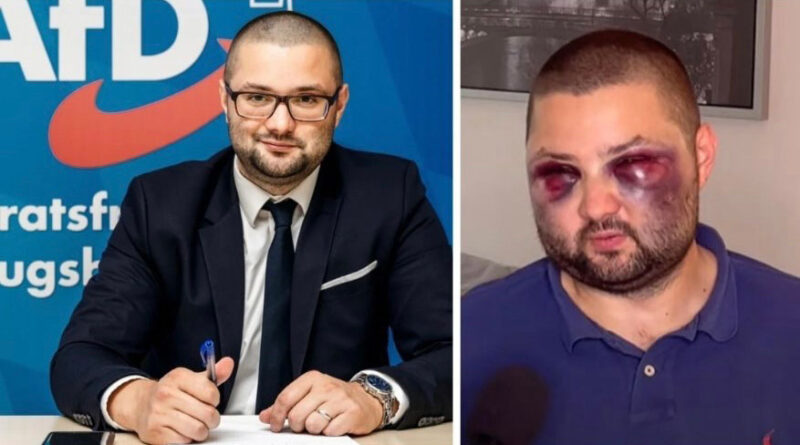
Continuously persecuted by establishment stormtroopers. AfD may have grown, but it is still subjected to attacks by antidemocratic forces that try to scare candidates away from political engagement and sabotage the party’s activities. Andreas Jurca, AfD politician in the German city of Augsburg, was recently brutally assaulted by non-European migrants. Jurca and a fellow party member were on their way home from a party event when Jurca was recognized from an election poster. He endured blows and kicks, resulting, among other injuries, in a broken ankle. Photos: AfD, Private
As an example of how AfD is treated in the media, a TV interview with former President Joachim Gauck about the reasons for the party’s success can be mentioned. The president managed the feat of completely avoiding mentioning any of the issues that Alternative for Germany aims to address. Instead, he attempted, through a lengthy reasoning referring to a recently published book, to explain the party’s increased voter support solely through psychological factors: some people have weak personalities, they need authorities, they are afraid to draw conclusions on their own, and therefore they choose AfD.
Several representatives of like-minded foreign parties greeted AfD’s conference with brief speeches via video link. Kostadin Kostadinov, leader of the Bulgarian party Vazrazhdane (Revival), stated in a simultaneously translated speech that he looked forward to good cooperation between Europe’s patriotic parties. He argued that AfD is “the authentic bearer of the best German values.”
The leader of the Austrian Freedom Party (FPÖ), and former Minister of the Interior for Austria, Herbert Kickl, spoke to the delegates at AfD’s conference via video link, stating:
“One can hardly believe that it’s only been ten years since AfD was founded… You have given Germany hope, courage, confidence in the future – something that Germany has needed for a long time! If you handle the trust of the citizens with care, success will be assured.”
“We look forward to good cooperation between Germany and Austria with parties that are for the citizens and not working against them. Patriots in Europe’s homelands stand together!”
The AfD conference was marked by strong self-awareness, boldness, and optimism.
All rights reserved. You have permission to quote freely from the articles provided that the source (www.freewestmedia.com) is given. Photos may not be used without our consent.
Consider donating to support our work
Help us to produce more articles like this. FreeWestMedia is depending on donations from our readers to keep going. With your help, we expose the mainstream fake news agenda.
Keep your language polite. Readers from many different countries visit and contribute to Free West Media and we must therefore obey the rules in, for example, Germany. Illegal content will be deleted.
If you have been approved to post comments without preview from FWM, you are responsible for violations of any law. This means that FWM may be forced to cooperate with authorities in a possible crime investigation.
If your comments are subject to preview by FWM, please be patient. We continually review comments but depending on the time of day it can take up to several hours before your comment is reviewed.
We reserve the right to delete comments that are offensive, contain slander or foul language, or are irrelevant to the discussion.

New App Helps Locate Sweden’s Historic Runestones
A new app called Swedish Runestones will help locate historical gems.

Swedish military wants to remilitarize the Åland Islands
The demilitarized autonomy has previously been known as 'the islands of peace.

NOAA Predicts Zero Sunspots for Almost the Whole 2030s
CLIMATEThe United States' government scientific organization, the National Oceanic and Atmospheric Administration (NOAA), predicts zero sunspots from 2031 to 2040. This is an extreme situation that has not occurred in as long as humanity has been counting sunspots, and it leads us into uncharted territory in terms of our solar system. However, this prediction aligns with the warnings of the world-renowned solar researcher Valentina Zharkova for many years, who indicated in 2019 various signs of this catastrophic phenomenon, including the extreme hailstorms we have seen in Europe and the world this summer. The forecast and various observations this year give cause for very significant concern. In this unique analysis, Free West Media explains why.

European Nationalist Parties Forge Cooperation Ahead of EU Elections
EUROPEAN ELECTIONSOn Saturday, August 26, representatives of six European nationalist parties gathered in Budapest. The meeting was initiated by the Hungarian party Mi Hazánk and took place in the national parliament. Representatives of the parties signed a joint declaration that not only reaffirms the parties' friendship but also their unity on a range of complex political issues. A surprisingly clear and radical manifesto was established. The hope is that this cooperation will lead to success in the EU elections and eventually result in the formation of a group in the European Parliament. For Swedish nationalism, this meeting marks a success as Sweden, for the first time, has a party represented in a leading nationalist cooperation in Europe. Free West Media was present at this historic event.

Turkey Believes Sweden Hasn’t Done Enough
Sweden will have to wait a bit longer for NATO membership, according to Turkey's Justice Minister Jilmaz Tunc. First, Sweden must extradite the "terrorists" Turkey wants and stop the desecration of the Quran.

Swedish Weapon Takes Down Russia’s Best Attack Helicopter
The Russian attack helicopter Ka-52 is considered one of the world's best and has struck fear in Ukraine, where it has hunted down tanks and other armored vehicles, often beyond the range of many light anti-aircraft systems. However, it has met its match in the Swedish air defense missile system RBS 70, which has quickly led to significant losses for the Russian helicopter forces.

The Sun Drives Earth’s Climate, Not Carbon Dioxide
Top Researchers Push Back Against Climate Lies."The correlation is as clear as day," explained the Israeli astrophysicist Nir Shaviv, who was hailed by the establishment, before his interview with Forbes was hastily deleted. What he says contradicts the climate narrative, which points to humans as responsible for Earth's climate. Shaviv firmly asserts that it is the sun that controls the climate, something that can be scientifically proven in many ways. Contrary to the popular belief, the sun's influence on Earth has, in recent years, caused unusually cold and rainy weather, a trend that solar researchers warn will worsen significantly in the coming decades. The sun has exhibited an unusually low activity since 2016, during Solar Cycle 24, which was the weakest in a century.

The Establishment Wants to Ban Germany’s Second Largest Party – for the Sake of Democracy
The rising popularity of AfD has raised strong concerns within the establishment. Despite lies and demonization in the media and isolation from the overall political establishment, the party continues to grow. Certain representatives of the party are accused of becoming increasingly "extreme," and in an unusual move, the influential weekly newspaper Der Spiegel demanded that AfD be "banned."

Dutch FvD break through the media blockade
What is happening in the Netherlands? It is often difficult to follow events in other countries, especially when distorted by system media. We give Forum for Democracy (FvD) the opportunity to speak out on the political situation in the Netherlands and the staunch resistance they face in trying to save the country.

The Ursula von der Leyen Affair
After a criminal complaint in Belgium against the President of the European Commission, the so-called SMS-case, now takes a new turn. The judge responsible for the investigation will likely gain access to the secret messages exchanged between Ursula von der Leyen and Albert Bourla, CEO of Pfizer, at least if they haven't been deleted.


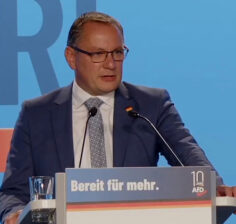
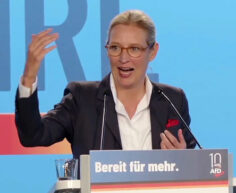
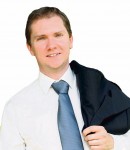
No comments.
By submitting a comment you grant Free West Media a perpetual license to reproduce your words and name/web site in attribution. Inappropriate and irrelevant comments will be removed at an admin’s discretion. Your email is used for verification purposes only, it will never be shared.